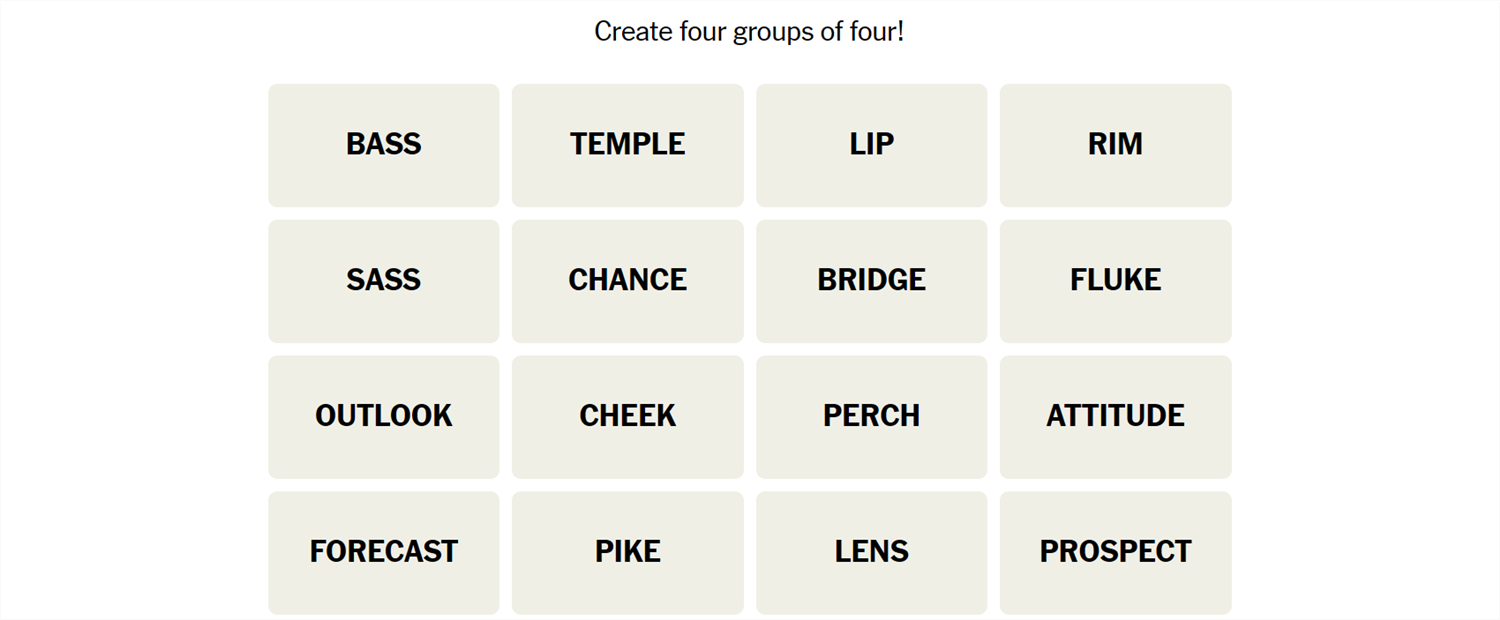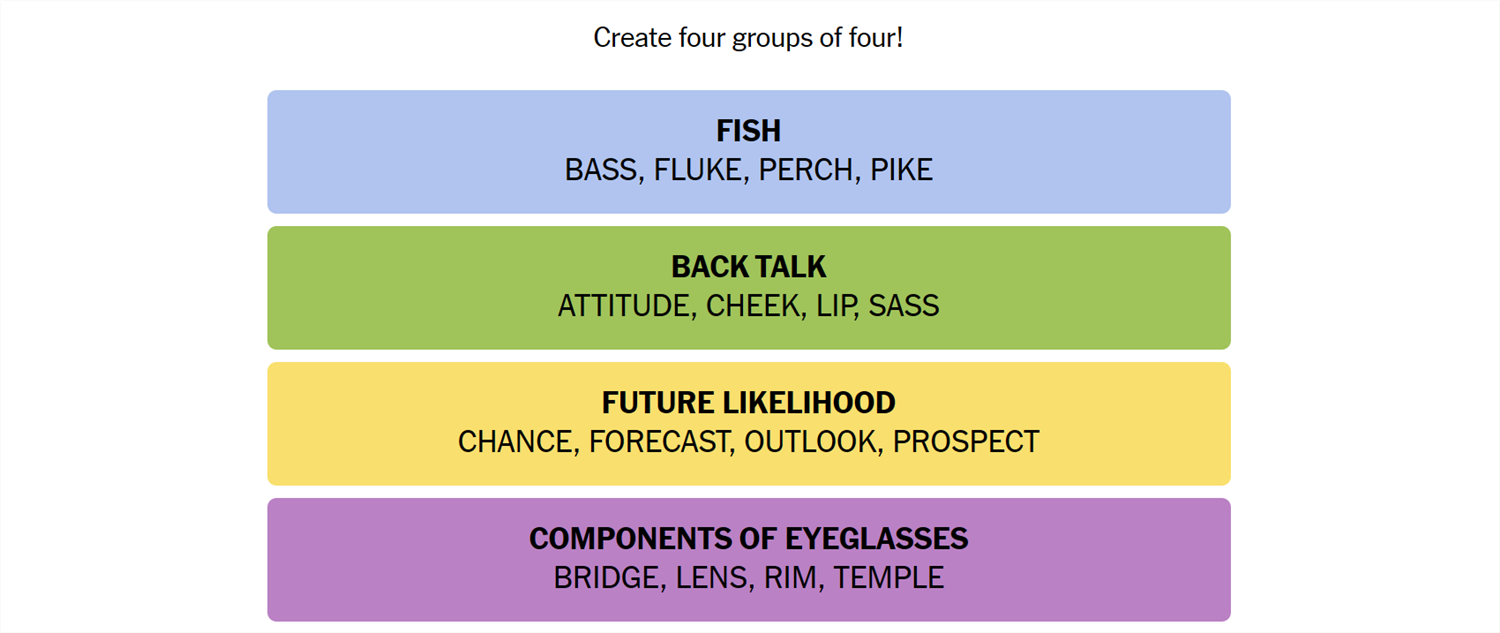Decode the NYT Puzzles on 'Connections' Hint & Answer Session for July 10 (#395) - Join In!

Decode the NYT Puzzles on ‘Connections’ Hint & Answer Session for July 10 (#395) - Join In!
Quick Links
- What Is Connections?
- Hints for Today’s Connections Groups
- Today’s NYT Connections Answers
- How Did We Solve This Connections Game?
- How Do You Guess Connections Groups?
Connections is a game from the New York Times that challenges you to find the association between words. It sounds easy, but it isn’t—Connections categories can be almost anything, and they’re usually quite specific. If you need a hand getting the answers, we’ve got you covered.
What Is Connections?
Connections is a game from the New York Times. The objective is simple: sort 16 words into groups of 4. Each group of words will be connected by some common idea or theme. That common element could be anything. We have seen everything from games that rely on the number of letters in the words to categories that require you to spot an extra letter at the end of the word. Sometimes they’re references to economics, other times they reference fairy tales. There is no telling what sort of association there will be between words.
Once you’re confident you understand the connection, select 4 words, then hit “Submit.” You have only four attempts in total, so don’t be too guess-happy.
Hints for Today’s Connections Groups
Here are a few hints for the 395th Connections game to get you started:
- Yellow: Probability.
- Green: A verbal rebuttal.
- Blue: They have scales and swim.
- Purple: Related to something you might wear on your face.

If you still need help, the actual group names are:
- Yellow: Future Likelihood
- Green: Back Talk
- Blue: Fish
- Purple: Components of Eyeglasses
Today’s NYT Connections Answers

Future Likelihood (Yellow):
Chance, Forecast, Outlook, Prospect
Back Talk (Green):
Attitude, Cheek, Lip, Sass
Fish (Blue):
Bass, Fluke, Perch, Pike
Components of Eyeglasses (Purple):
Bridge, Lens, Rim, Temple
How Did We Solve This Connections Game?
July 10th wasn’t too difficult.
The first group of words I spotted were fish: bass, fluke, perch, and pike. The Blue group (which seems appropriate for fish) was literally just “Fish.”
I noticed that attitude, lip, sass, and cheek were all “Things that can be given,” referring to some kind of verbal argument. It seemed likely they were in a group, so I just went for it. Green was “Back Talk.”
Chance, forecast, outlook, and prospect were pretty obvious once I was down to 8 words, no doubt because I had just been looking at the weather forecast for the next 10 days. The Yellow group was “Future Likilihood.”
That left bridge, lens, rim, and temple in Purple. At first, I thought bridge and temple might be related to architecture, but lens just didn’t fit with that. Eventually (after way too long, since the answer was literally right in front of my face), I realized the words were “Components of Glasses.”
How Do You Guess Connections Groups?
There is no quick, reliable way to approach Connections like there is with Wordle, since Connections isn’t algorithmic. However, there are a few things to keep in mind that can help.
- Look for similar parts of speech. Are some words verbs and others nouns? Are some adjectives? Try mentally grouping them based on those categories and see if any other patterns jump out at you.
- Are the words synonyms? Sometimes categories will just be synonyms for a phrase, or very close to synonyms. Don’t rely too closely on this, though. Occasionally, Connections will deliberately throw in words that are sometimes synonyms to mislead you.
- Try saying the words. Sometimes, saying the words helps. One puzzle we saw included the words go, rate, faster, clip, pace, speed, move, commute, and hurry—all of which are obviously related to the idea of motion. However, when you say them, it becomes a little more obvious that only four (go, move, hurry, faster) are things you’d actually say to prompt someone to get moving.
- Expect the red herring . Connections usually has words that could be plausibly, yet incorrectly, grouped together. Take the words Bud, Corona, and Light, as an example. You might instinctively see those three words together and assume they’re lumped together in a category related to beer—but they weren’t.
- Look for distinct words. If a word on your board doesn’t have multiple meanings or can really only be used in one context, try using that word as the basis for a category.
- Shuffle the board. Sometimes, moving words around will help you look at them in new ways.
If you didn’t solve this one, don’t feel too bad—there’s always tomorrow! And those words may align with a topic you’re interested in, giving you a leg up on the competition.
Also read:
- [New] Revamping Imagery Leading Insta Edits Explored for 2024
- [Updated] 2024 Approved IOS's Choice of Top PS2 Game Simulation Software
- [Updated] Best FREE Memes Unlock Humor in Everyday Life
- [Updated] Hidden Treasures The Undisclosed WINDOW 11 Tricks You've Overlooked for 2024
- [Updated] The Rising Riches of a Kid Star Ryan's Income Insights
- 「即時無障礙JPG到BMP格式自動變更 - 利用Movavi解決方案」
- 10 Video Üzerinde Daha Azalan Bir Geçiş Etkileyen Adobe After Effects'te | AE De Renderliyoruz
- 全自動変換機能!OGGAVI形式を無料でMovaviアプリによるオンライン変更。
- Convert Your Audio Quickly & Effortlessly! AIFF to MP4 for Zero Price via Web Service
- Easy and Quick: How to Save Flash Content From the Web Using Movavi Software.
- Gratuit Online OGM in Avi Video - Mouvavi's Effortless AVI Konverter
- How to Intercept Text Messages on Xiaomi Redmi Note 13 Pro+ 5G | Dr.fone
- How To Pause Life360 Location Sharing For Nokia G42 5G | Dr.fone
- Istruzioni Dettagliate per Superare Gli Ostacoli Dell'Outlook Disponibile Solo On-Line
- Movavi: 快適な画質でフリーウェブGIFからFLVへの高速変換
- New FCPX XML Mastery Taking Your Editing Skills to the Next Level for 2024
- Secure Wipe of iPhone Data on Computers: Windows & Mac Methods via Stellar Software
- Top 17 Outstanding Presentation Creators in Czechia Awaiting Mac Users Showcase
- Trasforma I Tuoi File Audio MP3 in Video MP4 Su Internet Senza Costi Con Movavi
- Title: Decode the NYT Puzzles on 'Connections' Hint & Answer Session for July 10 (#395) - Join In!
- Author: Christopher
- Created at : 2024-12-30 04:34:22
- Updated at : 2025-01-02 20:17:20
- Link: https://some-approaches.techidaily.com/decode-the-nyt-puzzles-on-connections-hint-and-answer-session-for-july-10-395-join-in/
- License: This work is licensed under CC BY-NC-SA 4.0.